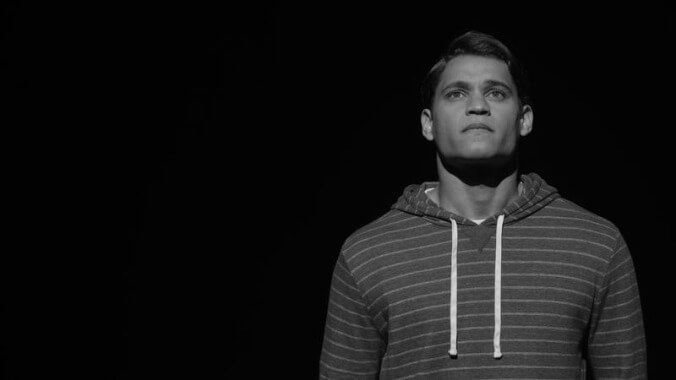On an ambitious Atlanta, a student's Blackness is tested
Donald Glover writes and directs a monochrome-shot satire that pulls out all the stops

The penultimate episode of this Atlanta season tips more fully in a horror direction (which the last anthology episode leaned toward, but ultimately stayed mostly slice-of-life). The protagonist in this segment, shot in monochrome, is Aaron, a white-appearing teen with a Black father. On their car radio, we hear that yet another Black teen has been killed in a police shooting. The economic realities of Aaron’s household are different than those of his classmates: His father isn’t paying for the college he wants to attend with his white girlfriend and friends. Dad won’t even fill out the FAFSA (the government forms that determine every student’s eligibility for financial aid). And if Aaron still lives at home after high school, he’s going to pay rent. But, as his dad reminds him, he loves him.
At school (Stonewall Jackson High, pointedly), a millionaire alumnus announces that he’s bestowing a million-dollar gift and paying the college tuition…of all Black students. Will Aaron qualify?
A few scenes here rank among the series’ most satirically sharp, but the episode foils itself a bit. We’ve come to expect more from the show than broad satirical strokes, even from the anthological characters. And that’s the disadvantage of these standalone episodes—you need to imbue your characters with complete life from scratch for the episode to work; there’s no history to fall back on. In other anthological episodes this season, Atlanta has done it artfully, but here, it creates a character that’s too complicated for the script.
First, the positives. Like “The Big Payback,” the episode exposes the paranoid nightmares and ignorance of the anti-affirmative action contingent and the obliviousness of naive kids prone to false equivalence. (In this case, Aaron’s white friends believe, “It’s super-easy to go to school if you’re Black,” “they all go to school for free,” and they might be entitled to sue over the scholarships because it’s discrimination on the level of “what they did to Black people in the ‘50s, right?” Um, no.)
In a scene that revisits the theme of the appropriation of Black culture and who profits, at the high school, Aaron wanders before a panel where his Blackness is tested for scholarship eligibility by the benefactor and his friends. (Outside the auditorium, he’s counseled by a kid who advises that the benefactor’s true interest is “the culture of Black in America; it’s a nuanced discussion.”) Of course, there is no nuance to what follows: Aaron is required to provide trivia answers like “227 or Amen?” and “if you put your foot in it, it’s good,” and, ultimately, to dance. Ominously shot more like a darkened interrogation scene than an audition, it’s partly harrowing, partly hilarious, leaning heavily toward the former.
Ultimately, Aaron is judged to be white; he’s denied the money, and his girlfriend dumps him. Dad’s reaction is to shrug it off as “part of being Black. Sometimes you don’t get the things you know you deserve.” Dad comes in for critique here. Some fathers would have marched up to the school before Aaron did, but this one is too resigned to fatalism and tough love to fill out basic financial aid forms to help his son compete. Aaron is squeezed between two cultures, lacking the currency to fully join either one.
This tension explodes in one of the show’s sharpest moments. Aaron and a dark-skinned Nigerian classmate, both jilted for the scholarships, show up in front of the school in the middle of the night with flamethrowers, determined to burn down the building. But who deserves to go first? In a brilliantly written exchange, Aaron lectures the classmate about how he’s not really Black. The show has previously explored the question of what signifiers qualify as Black vs. white in today’s culture (see Lorraine’s final conversation with Al in “New Jazz”), and what is “Black enough” (see Al’s assessment of the diversity advisory committee in “White Fashion”), and this takes things to the ultimate absurdist extension.
The concluding scenes provide turnabout after turnabout upon turnabout. The Nigerian classmate is shot by police, thus earning the scholarship after all. It’s Aaron who ends up in the back of a police car, his post-high-school future set. And it’s here that the satire turns a bit ham-fisted, delivered with a blowtorch instead of the precision instrument behind this season’s “White Fashion,” “The Big Payback,” and even the euthanasia scene in “Sinterklaas Is Coming To Town.” Series creator Donald Glover wrote and directed the episode, and he pulled out all the stops, pocketing any pretense toward subtlety.
But this script may have hit harder with some blanks filled in. (The show has struggled with a tendency toward the elliptical this season, particularly in the anthology episodes, tucking some statements into Easter eggs instead of just making them.) Ultimately, Glover heavily focuses on a protagonist who comes off as a sketch; it would have been interesting to explore him a bit more.
Stray observations
- I legitimately LOL’d at the Logan Paul Comedy Tour T-shirt hanging on Aaron’s wall in the opening scene.
- Aaron himself doesn’t escape critique: In that opening scene, he uses racial slurs after gaming with a couple of other kids.
- Aaron’s sneakers, a preppy brand popularized on Instagram, also get subjected to roasting (both in front of the tribunal and literally, in the flamethrower scene). A tribunal member: “He has no Black friends! They would have told him not to come in here in those mocha-colored Allbirds!”
- A choice moment at the tribunal: “You don’t have to call him Clarence Thomas—he’s not that white.”